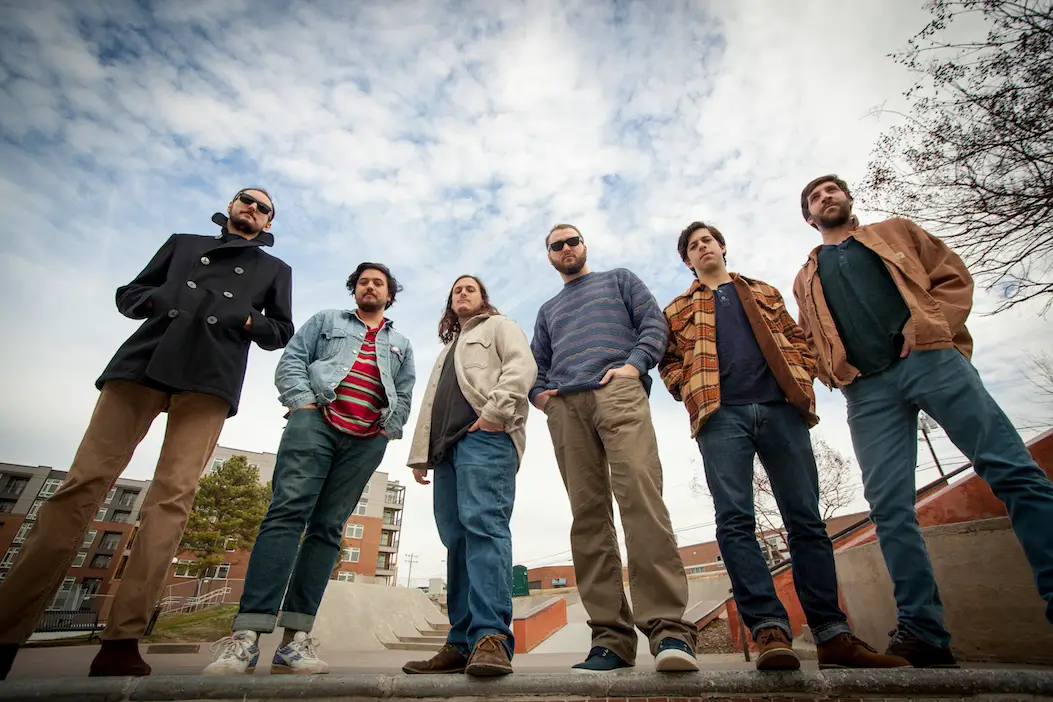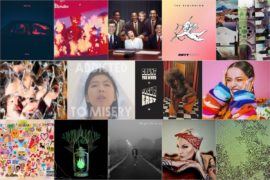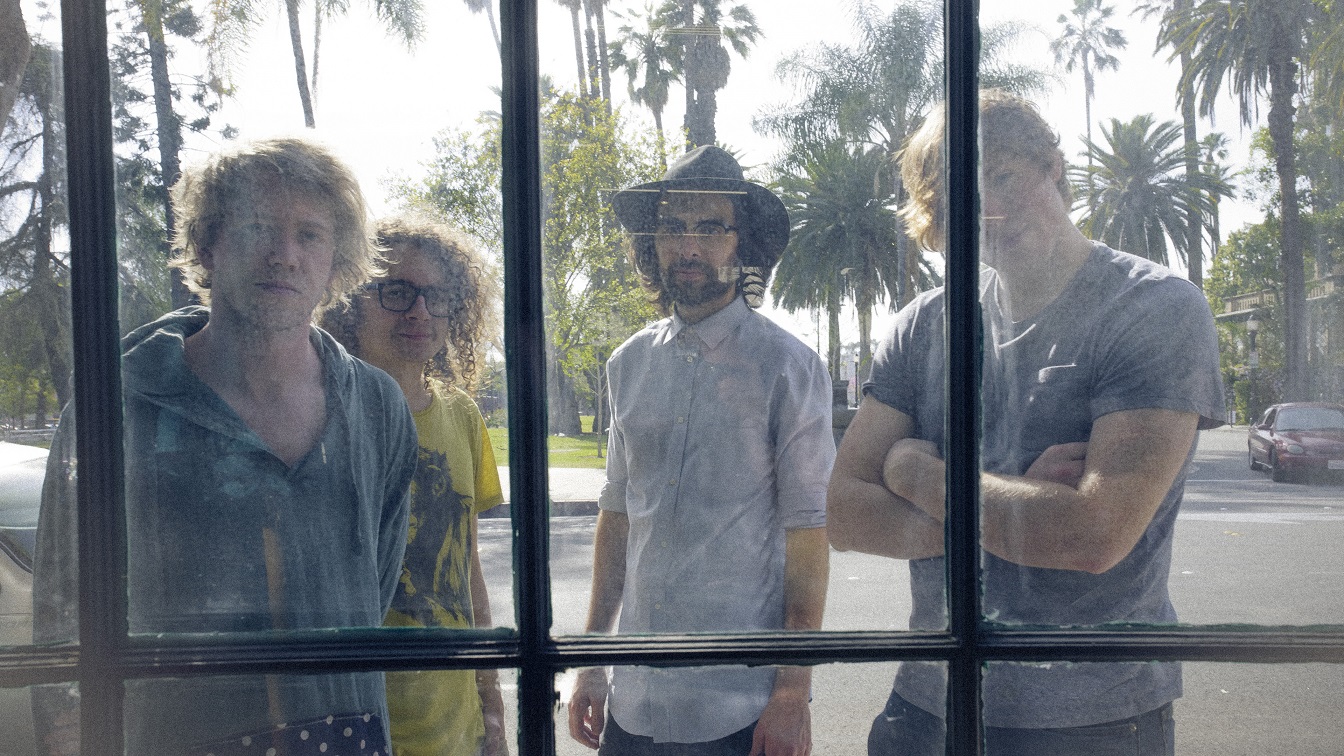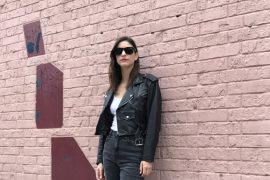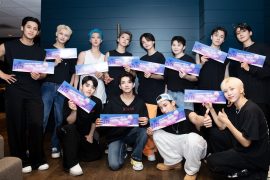Australia’s self-proclaimed greatest boyband, indie rock phenomenon Vacations discuss the search for self-comfort and coming to terms with persistent mental health battles in their 2024 third record, ‘No Place Like Home.’
Stream: ‘No Place Like Home’ – Vacations
Australian indie rock phenomenon Vacations need little introduction – the quintessential indie-pop group self-proclaiming (and rightfully so) the title of “Australia’s greatest boyband” – have seemingly taken over the indie rock world with their distinct twinkly sound, unwavering authenticity and engaging presence all over the world.
And they’re just getting started.
The Newcastle DIY 4-piece group, steered by lead singer and guitarist Campbell Burns and joined by bandmates Jake Johnson, Nate Delizzotti, and Joseph Van Lier, check all the boxes of that classic indie pop concoction – chorus-drowned major seventh chords, dreamy riffs that serve as the backbone for many of their most popular hits, and a steady yearn displayed in the words of Burns, who deals with subjects of finding one’s stride in life, fostering meaningful relationships, and understanding the realities of navigating such formative years.
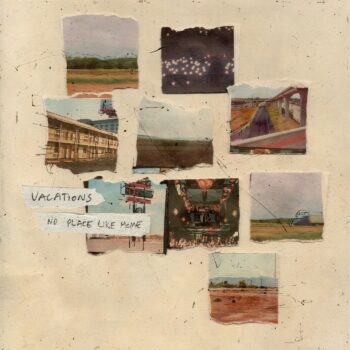
Vacations’ third full-length record No Place Like Home establishes itself as a victory lap of sorts – a sonically mature, thematically intense compilation of tracks that follow a remarkable journey of unexpected success, attributed to the group’s 2016 EP Vibes unexpectedly blowing up, with tracks such as “Young,” “Relax” and Home” garnering 555 million, 115 million, and 75 million streams on Spotify, respectively.
It’s undeniably easy to get lost in the entrancing wooze of Vacations’ melodies; and once you snap back into reality, the realization of intense depth encroaches. Things aren’t all happy-go-lucky, but rather dire, distressful, and worrisome – a magnifying glass to the struggles defined by Burns, whose battle with mental health and official diagnosis of Pure OCD comes to light in the band’s latest record.
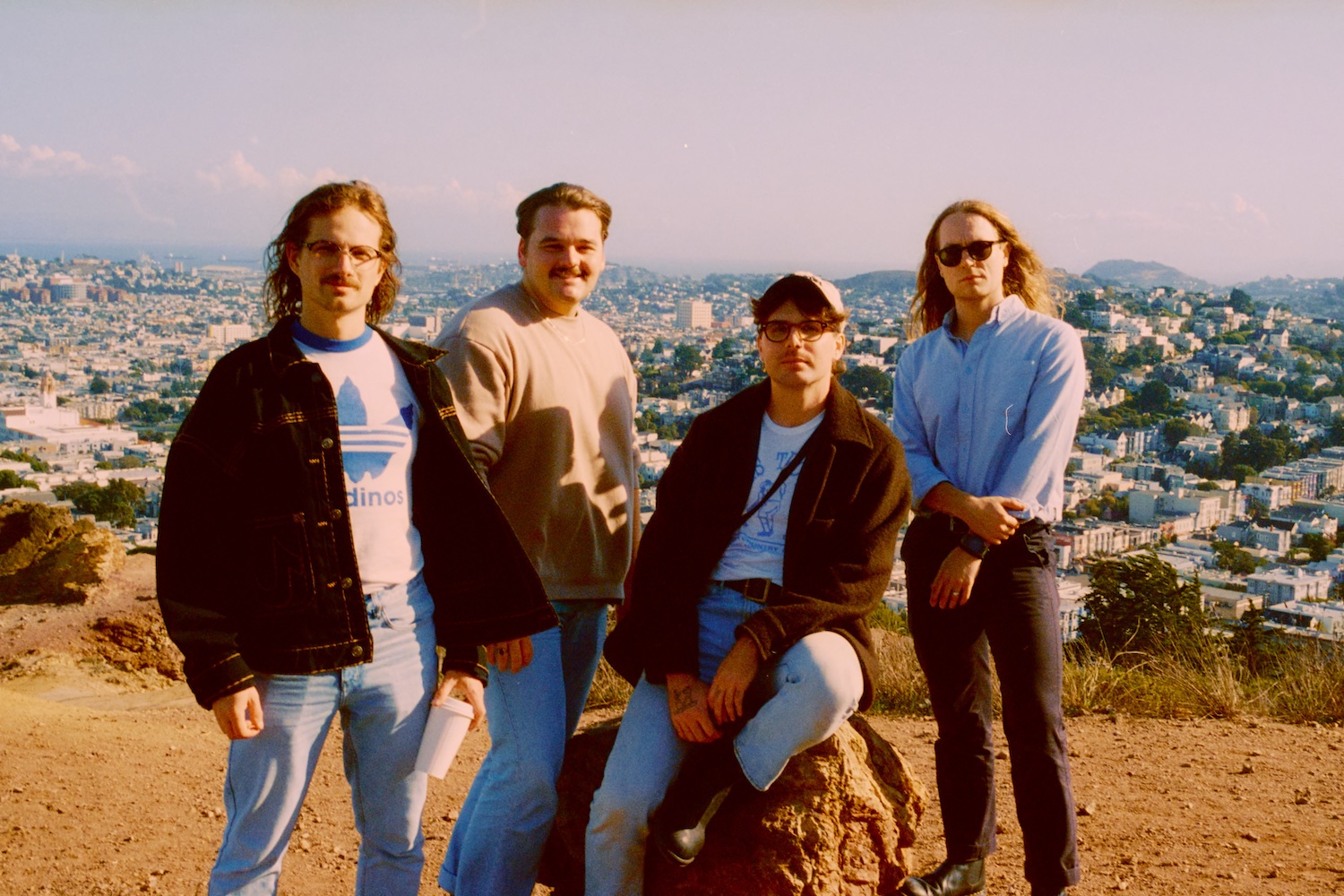
“I began to hit a wall, and then another wall,” Burns elaborates of this time. “I found it extremely difficult to write anything for years. I didn’t know what Vacations’ voice was anymore, or even my own in a day-to-day sense. I had to find a way to fall back in love with music and so much else in my life, or I knew I would simply cease to exist.”
And rightfully so – for a band who had just found immense success in 2019 to be abruptly shut down due to a global pandemic, there was a bleakness to creativity felt amongst many. Fast forward a few years – as life began to return to normalcy, so did Burns’ creative spirits, empowered through the return of playing in front of live audiences and a resurgence in confidence to discuss personal battles, thus inspiring the creation of No Place Like Home, kicked off with the release of single and opening track “Next Exit.”
“‘Next Exit is about living in this monotonous cycle,” Burns reveals. “You realize that you need an out. You need to – metaphorically and literally – take the next exit out in order to break out of that cycle. You almost need to make yourself uncomfortable in order to grow and prosper as a person, rather than just doing the same thing every single day.”
Setting the roadmap for the rest of the record, “Next Exit” is followed by 9 tracks that similarly deal with growth, complacency, and self-discovery, all themes that Burns acknowledges are difficult to grapple with, yet exceptionally valuable to tackle head on.
Tracks such as “Terms and Conditions” and “Over You” provide a key to the lock of Burn’s head, a candid look into the realities of the struggles and battles of conflicting thoughts festering and eventually consuming everything.
“I wrote [“Terms and Conditions”] with the intent of making sure that if other people had a similar condition or experience, then they could feel okay. No one should feel ostracized or alienated by going through struggles with mental health. Everyone just wants to be heard and feel accepted.”
My spirit wanes
From your, offguard, distractions
It’s a quiet oblivion
Crushing into violence
I’ll play
Hide and seek
On your terms
Despite my condition
I can’t
Think straight
Yet I have 20/20 vision
Learning how to walk again remains a recurring theme throughout the record, both emotionally and socially,
yet there remains a creative optimism of sonic maturity and experimental songwriting that Burns attributes to his desires to play around and leave the classic 4-chord indie pop confinement.
“I had this loose concept of No Place Like Home being an Americana-influenced album,” Burns says of the record. “I wanted to incorporate more pianos, acoustic guitars, Nashville tuning, and country inspired lap steel, but then also bringing in drum machines and synths and finding a mix between the two.”
Without straying too far away from the unique and identifiable sound Vacations have established for themselves, the layering and phrasing of the record is intricate and captivating, an upward stride for the group as they continue to excel globally – with no signs of slowing down.
Atwood Magazine sat down with Campbell Burns to discuss Vacations’ recent accolades, his open battle with mental health, the realities of being an indie band from Australia and his recent move to Los Angeles.
— —
:: stream/purchase No Place Like Home here ::
:: connect with Vacations here ::
A CONVERSATION WITH VACATIONS
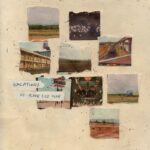
Atwood Magazine: First, congrats on the release of No Place Like Home! You guys have been very busy… Kimmel, Colbert, shows in Australia… are you breathing? How did the late night show grind treat you?
Campbell Burns: I’ve been traveling for 14 months – I figured that out when I got back. Just straight non-stop, and now we have the biggest break; I’ve got two and a half months off just to actually hang out at home which is great but I’m not used to it so it’s kind of weird.
I remember being in New York and we were already there for CBS, but then management told us, “hey, you just got Kimmel.” We also got Colbert for their YouTube series. And then they were like, “you got Triple J feature album,” like all these accolades and press and features. And I was like, I need to lie down. This is too much. But it’s also everything that we have been actively working towards as a band for almost 10 years now. And it just all happened in that one day. And this year already feels so long because so much has happened within such a short period of time. But… It’s incredible. I feel really grateful for it. I feel really privileged for us to be recognized for our work. We always have been in some capacity; we’ve always had a word of mouth fan base, but now it’s reaching a point where it’s more commercial and critical success, which is really important. That’s always a stride I’ve wanted to hit, just to be reached out by those kinds of influencers or those kinds of networks. I think it’s really important for the longevity of the band.
I was on your Instagram and I saw one of your photos that said, “Jimmy Kimmel and Jimmy Fallon are two different people.” Did you guys get confused there?
Campbell Burns: They have this trailer in the car park where you can just get snacks and they had that photo there and you see it on the way out. It killed me. Also, I know there’s a lot of American late night TV, but I’m like, “who does what?” And I’m also like, “what’s the tier list or like the hierarchy?” Because I was trying to figure that out. And yeah, it cracks me up. But it was a really good experience.
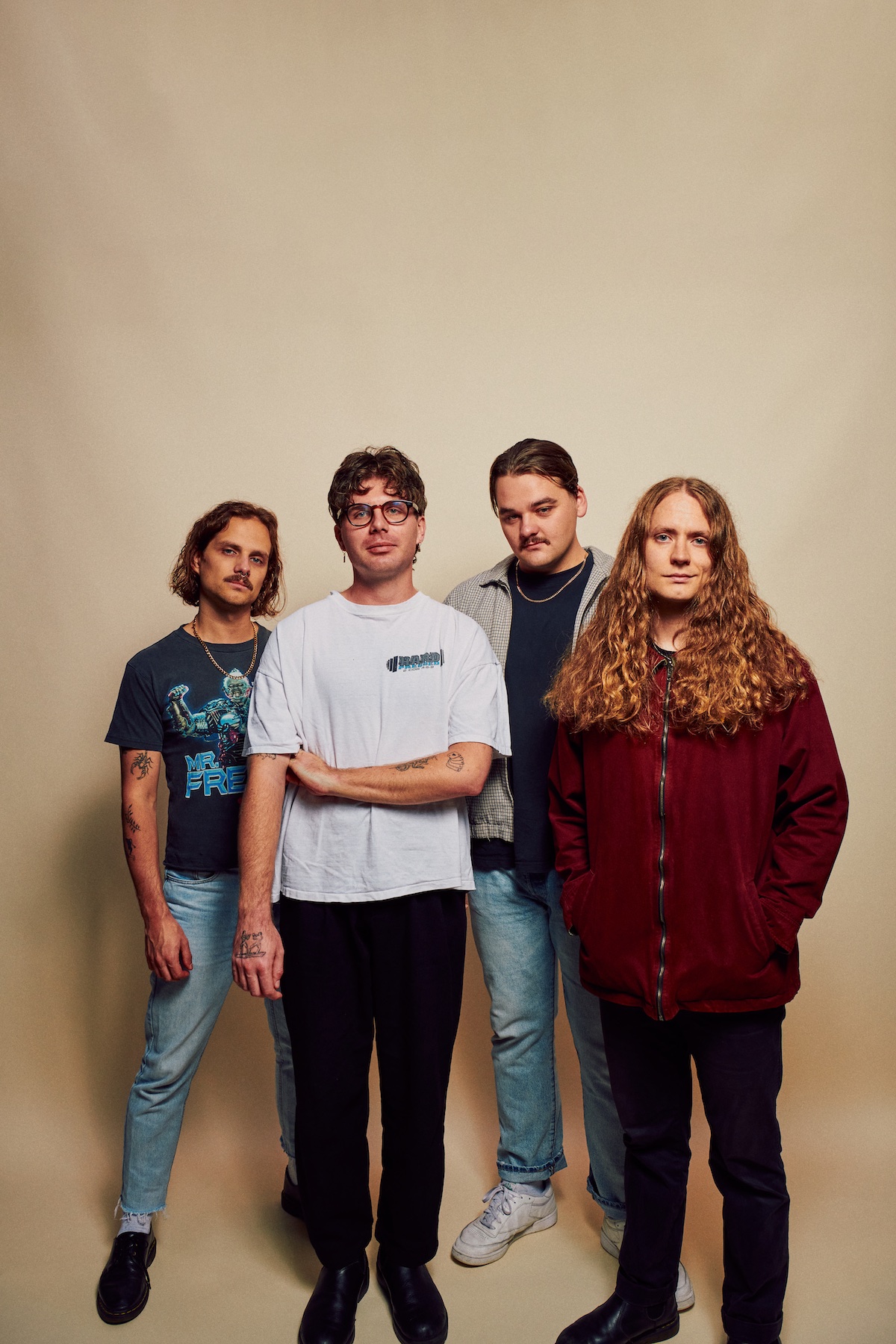
Do Australians watch a lot of American late-night TV?
Campbell Burns: Yeah, a lot of Australians watch it, that’s the really big one. SNL, people watch KEXP, NPR’s Tiny Desk, all of that stuff is huge and it has so much reach. I think even someone that’s not that inclined to music – if you’re on a late night TV show in the US, that’s a pretty big deal. So lots of people reached out. Even people I haven’t spoken to in years from high school reached out being like, “that’s so sick, congrats.” Which is kind of strange, but I’m here for it. It’s awesome.
It's especially awesome to see indie bands on late night TV – these shows are reaching out across genres, giving more exposure to a population that may not listen to that type of music.
Campbell Burns: Which was funny because I checked the YouTube comments shortly after it was uploaded and there were so many people that were like, “oh no, he’s singing with auto-tune.” But then there were people being like, “oh, he has perfect pitch” or “he actually sounds out of tune”. And I’m like, you people can’t make up your mind. And then all our fans come in saying this is great, this is fantastic. It’s so funny. People being like, “oh, they’re using backing tracks, back in my day, when I listened to Led Zeppelin, they wouldn’t have done that. They would have just rocked out.” Everyone’s an expert. It’s funny reaching that level of exposure; you really are perceived in so many ways. It’s funny navigating that.
No Place Like Home deals with some pretty personal, sensitive matters, including your battle with mental health. At what moment did you decide you wanted your record to reflect what was going on in your head? How and why did you decide to bring such personal things to the public eye? Was that intimidating?
Campbell Burns: That’s not something that was a conscious decision. That just kind of happened naturally over time. So I can’t exactly pinpoint the moment when I reached that. But I feel like our music has always been kind of personal and it’s just my way of writing lyrics and expressing myself. But I think especially after having a writer’s block and then going to therapy for about three years, getting my diagnosis of pure OCD and just writing about these experiences and trying to figure out where I’m at currently, but also sort of reflecting on how I was before and almost grieving for this younger version of myself I didn’t know any better. I don’t know, I feel like it’s something that was initially a lot to process and a lot to deal with, but it’s something that’s almost become a strength of mine. And it’s something that I try to be very open and candid about because it’s just how it should be.
I don’t think there should necessarily be a stigma on mental health or therapy. Especially having something like pure OCD, which is a little bit more niche than other conditions. Not that it’s a competition, but if I can start a conversation around that and help others by expressing myself through art, then that’s fantastic. And if it creates community, which is something that’s really important to me, that’s even better. And since the record’s come out, people have reached out saying that it’s really helped them or it’s helped them feel seen or recognized. And I think that’s just really special and important. And it’s also just something that’s really personal to me and something that I care a lot about. And that’s what I want to be writing about. And I think in turn, it just makes for good art or at least art as substance.
I like that it’s probably almost a conceptually and thematically realized album and everything kind of ties together, which I’m really proud of because I feel like before in the past, it’s been more or less just a collection of indie pop tracks that are kind of like a loose time capsule. There’s maybe a loose story there if you really try hard, but [this record] is very much from start to finish, there is a very clear and concise theme. And yeah, I’m really proud of it.
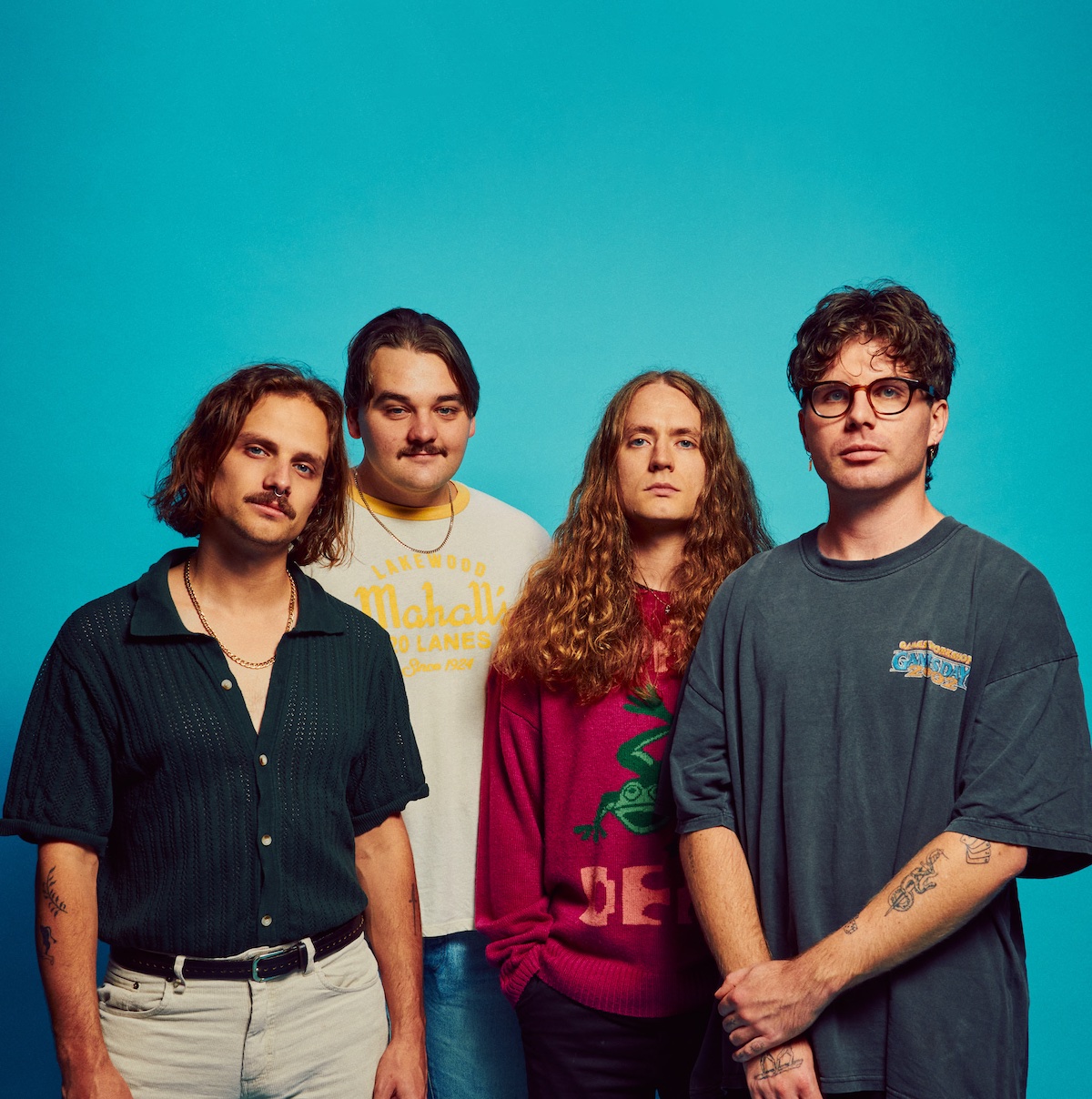
I guess that coincides with what you said about not having the conscious realization that you’re putting something out there that could potentially freak you out.
Campbell Burns: Yeah, it’s a funny thing because people will be like, “oh, what’s that song about?” And I’m always like, “I have no idea.” Genuinely – when I’m writing music, sometimes I’ll sit down and I know I want to write about something but how do I write about it? And then it’s just this outpouring of emotion and in my perspective in that moment, it’s like, oh, cool, I have a song and I just feel really good about having a song and I’ll play it over and over and over again. I tend to think that songwriting is a really dynamic process. And I think the meanings of songs should be able to change and fluctuate over time as you grow and develop and have more life experience. And it’s just kind of my standpoint on it.
And one thing that I appreciate about the record is that the lyrics are certainly more introspective and personal, but sonically the record doesn't seem to be sad and angsty as you would expect. Was that on purpose? Were you trying to keep it sonically happy?
Campbell Burns: Again, not really. I know in my heart, it’s almost kind of a crutch at this point, but I just write pop songs at the end of the day. And I think I wanted to write some more upbeat or fun kind of songs. I think one of the things that was obviously very influential was touring through the States again and again and playing larger venues each time, seeing these crowds, how they would react and certain songs that we wouldn’t have thought would work live hitting really well and wanting to lean more into that context and that space. That just really informed my songwriting. So that’s why you have songs like “Next Exit” or “Close Quarters” or “Midwest,” especially “Midwest;” that’s a fun one because of the whole duality of a very fun upbeat song, but the lyrics are just very, very sad. And I didn’t want to write another ballad or another sad song. We have plenty of sad songs already. I wanted to write something more fun. It’s a healthy balance, you know?
And speaking of the Midwest, I was reading that you had this vision of an Americana inspired track. How did that come to be?
Campbell Burns: Just honestly touring through the US and seeing the landscape, seeing all the different cities, meeting people here, listening to more music that had lap steel or banjo, being introduced to open tunings, Nashville tuning, just really gravitating towards those sounds at the moment. I actually got a banjo recently because I really want to learn it. Also there’s only so many times I can pick up a guitar – especially after playing guitar for 10 plus years – and just play the same jazz indie pop chords. They aren’t inspiring to me anymore (even though I can play chords for days) I need new sounds and I find it a really interesting challenge for myself to be like, well, how can I take new instruments or different sounds or aesthetics and adapt it and make it work and make it sound like Vacations even though it’s not the traditional Vacations setup of what people would have in mind. That to me is really appealing as a songwriter because at the end of the day, it’s all about the emotion that’s carried across, not necessarily like, we use this guitar tone or this pedal or whatever.
You said that you had to fall back in love with music and that's curious to me as you are someone who is living and breathing music, obviously. What did that look like for you? And how did you know that you had succeeded in falling back in love with music?
Campbell Burns: I think I reached a point where I was listening to music in such an analytical way that I was detached emotionally and I was listening to it in a way where I was like, “what’s this artist doing? What mics did they use? How did they get that sound? How did they get this?” Rather than just simply sitting and thinking about the feeling that was washing over me when I was listening to the music. I was getting very in my head and in a way that almost felt competitive. Like if I listened to an artist, I’d be like, “oh, well I have to do a song that’s as good as this;” I was just setting myself all these rules and boxing myself in of all of these boundaries that weren’t necessarily real. And I think part of that did help by getting the OCD diagnosis because I was able to have a degree of separation. I’m not able to think so much. I’m not allowed to dictate my songwriting. I was just simply able to create because I wanted to create and I wouldn’t be so judgmental. I wouldn’t care about not finishing the whole song in one day or not figuring out the chorus or anything like that. I was just simply enjoying it. Which helped as well, just listening to music and simply enjoying it rather than just constantly trying to seek something out and overthink it.
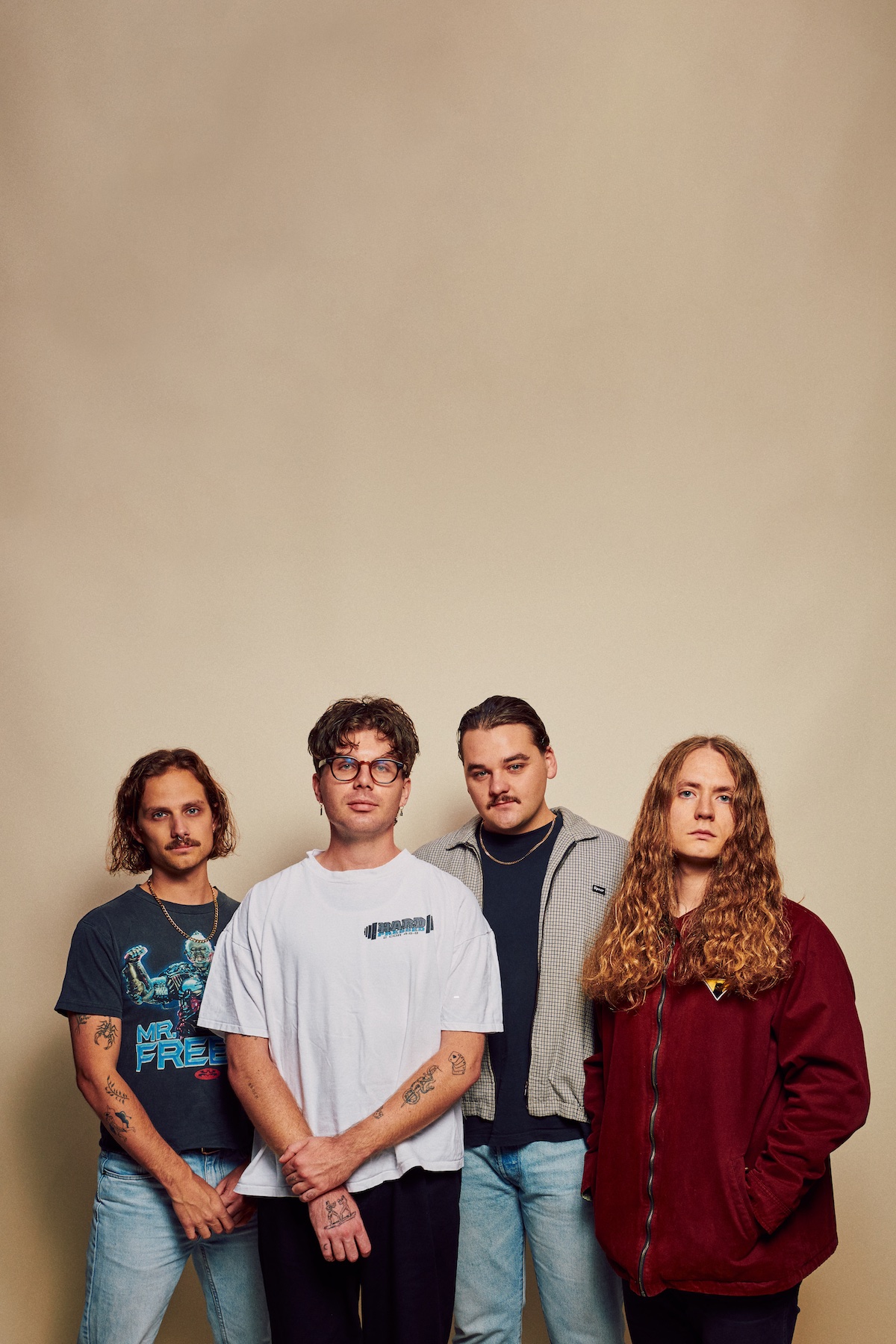
What does that look like when you’re touring?
Campbell Burns: When you’re on tour constantly playing shows it’s great, but sometimes I don’t really listen to any music at all. And then if I’m mixing, I’m probably listening to the same 16 bar loop of a drum kit for two hours straight. And then the last thing I want to do is listen to more music.
One of the things that kinda helped was just listening to artists that sound a lot like us, but then I remember at the start of like last year, I was listening to like a lot of Slayer and Ethiopian jazz and just like trying to branch out and listen to things that were completely different, but it made me enjoy music so much more. Cause when I went back to my process of making music, it just sounded completely different, but I was pulling it from all these different genres subconsciously.
I'm also curious how much your upbringing in Australia has influenced your theme of entrapment and needing to get out.
Campbell Burns: Yeah, that’s always interesting. I find it funny when people are like, “oh, Australian band, they’re sunny surf rock beach music.” Just because we live near the beach does not make us beach rock. I know within myself that I tend to write about themes of home and community and where do you belong; all these kinds of existential questions, and I think early on, I was very grateful to be part of a very strong community in my hometown Newcastle where everyone was in bands, everyone was artists, we had this collective that we started just after high school called No-Fi and we would put on DIY shows wherever we could, we put on warehouse shows or raves, art galleries, art exhibitions I should say. And that was really fun. I just felt so a part of it. And everyone was doing all of these really cool things. We’re all pushing ourselves and just making good art.
zAnd then it reached a point where everyone kind of got what they needed out of it and everyone was kind of starting to go separate ways. I really do love the Australian music scene. I think it’s in a very interesting climate at the moment, because unfortunately, the cost of living is getting so high in Australia. People aren’t going out as much. There’s also a culture of people only really going out Friday to Saturday, rather than where I’ve noticed here in America or anywhere else really in the world. It’s like people go out every single night. Like you can, there are shows on all the time which is really fun. But then in Australia, you can only essentially tour on weekends. And then there’s only a handful of cities you can play in because the population is so thin, but then the country is so vast that you have to drive insane distances. Like you’re doing like 12 hour drives just to get to the next major city or you’re doing flights and that’s expensive on its own. So it’s isolating, we are very far away from everyone else in the world but I would say there is a really strong community there at the same time because there’s not that many people that live there. It’s like everyone kind of knows each other. Everyone tries to help each other out. Everyone’s aware of all the pitfalls of the Australian music industry as well and I think that’s also a cause of frustration. I have noticed a lot of musicians are actually starting to move overseas. I’ve actually got a lot of friends that are now just moving to Los Angeles because there’s just simply more happening here. There’s more to do. There’s more opportunity, more of a chance to grow as a person and an artist. But yeah, I really am grateful to be an Australian artist.
For example, There’s lots of really good post-punk bands that are coming out right now as well, but it’s tricky too, because it’s such a niche market. So the ceiling is so low, unfortunately. But I bet that if any of those artists got the chance to come to the US or the UK, Europe, wherever, they would just explode. People would love it so much.
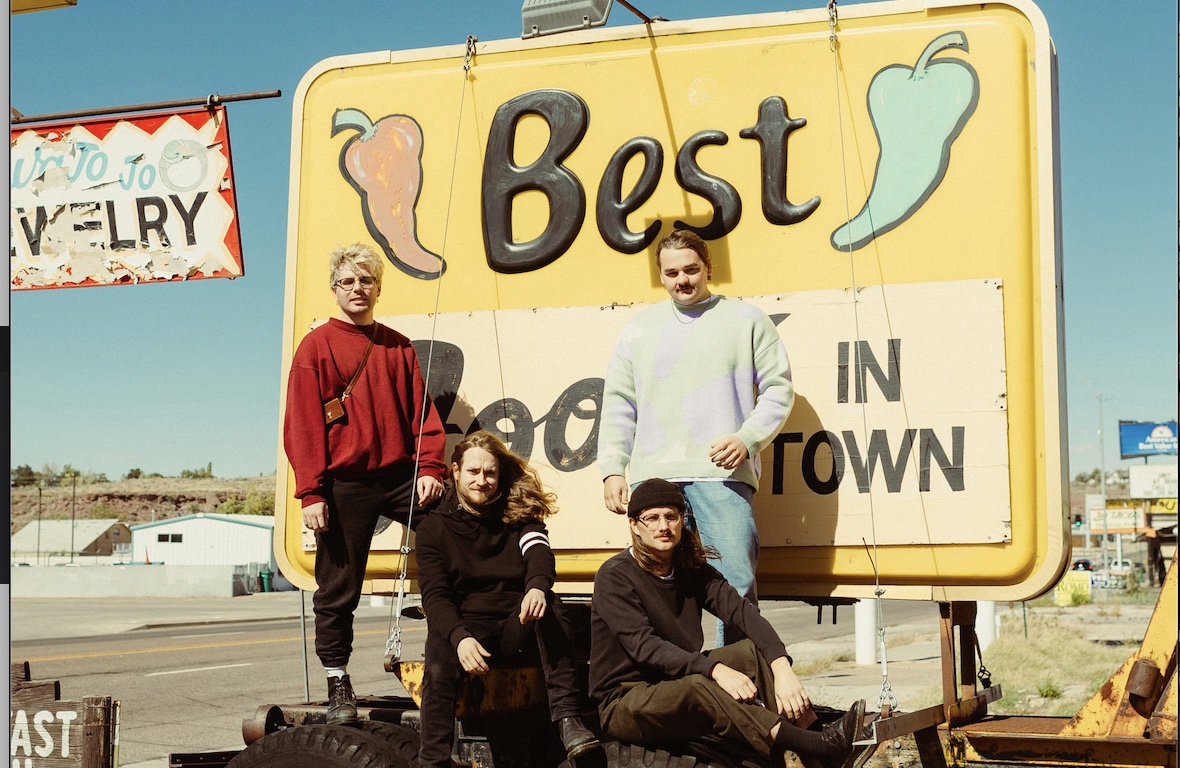
Is it difficult for Australian artists to get out and find success, whether locally or internationally?
Campbell Burns: So Australia has this phenomenon called tall puppy syndrome where it’s like as soon as someone reaches success, everyone around them wants to cut them down or exclude them. I don’t know why – I think it might be an older generation thing because I’ve never understood it.
I was curious if you have a track off of the record that you especially hope is appreciated.
Campbell Burns: I feel like I change all the time, but I would say “Close Quarters” is one of my personal favorites just because of how that song came to be and the use of that sample. It just feels like this really beautiful uplifting song. And the strings – I’m just so proud of it. But then “Lost in Translation,” the final track, just because that song is barely a song, it’s essentially just a really long verse and then a really long instrumental that fades out and actually loops back to the start of the album almost seamlessly, which I’m also really proud of because I’ve always loved the idea of having an endless album and conceptually starting that whole cycle again. But I think that track is also so raw and honest and it’s just really sad.
How do those tracks influence your creative vision moving forward?
Campbell Burns: That last track is definitely a direction I kind of want to pursue more in a solo context. I definitely want to start doing more music for myself, just because I feel like with the new record, it’s really established Vacations as a band, which makes me really happy. Because for a short while there, it was sort of like, well, is Vacations a solo project or is it a band project? What’s the dynamic, how do you balance that? Which has always been tricky to maintain, but we’ve always figured it out in the end and now it’s at a very comfortable place. And I can say that with a lot of confidence, but I think a lot of those sounds and textures are things that I would like to explore in future in a certain direction for myself, but then I can also imagine it in a more pop-oriented capacity with Vacations. And that kind of leans more towards that chamber pop 60’s style sound that I’m very interested in trying at the moment.
We have to talk about TikTok – your music had a monumental showing over quarantine. I’m assuming you probably didn’t expect that… How do you feel about that app from an artist standpoint?
Campbell Burns: Those trends were insane. We didn’t even have to do anything. Despite what the record label or anybody else told us to do, it was all self-perpetuated. Fans just gravitated towards it. It wasn’t an overnight success. It was gradual and then it just kept going on its own terms. We eventually started posting, but I treated it in a very unhinged, chaotic way. I was like, I don’t want to make a day in the life of a musician style video or any of those really cheesy and inauthentic videos where people are like, “oh, I just wrote the hit song of the summer and I’m like, “no you didn’t, the record label just paid you to say that, don’t lie.” But yeah, I just started s**ttposting. I was getting a lot of ads on Instagram for really bad mobile games and then I would just dub our music over the top and that did way better than anything we could have possibly produced ourselves. It’s funny. I have a love hate relationship with TikTok. I think it’s a platform that’s going to be on the way out. I’m curious to see what comes next. But I would love to see a return to slower social media based platforms like Tumblr or SoundCloud, which especially needs to make a comeback because I was on SoundCloud back in 2016. And that’s how I met so many musicians.
I just really love the whole idea of listening to people’s music the day it was uploaded and just leaving a comment and then you connect and you collaborate or you become friends with people all over the world. TikTok’s so like fast paced. It feels like fast food or something. It’s a slippery slope that you can fall very quickly.
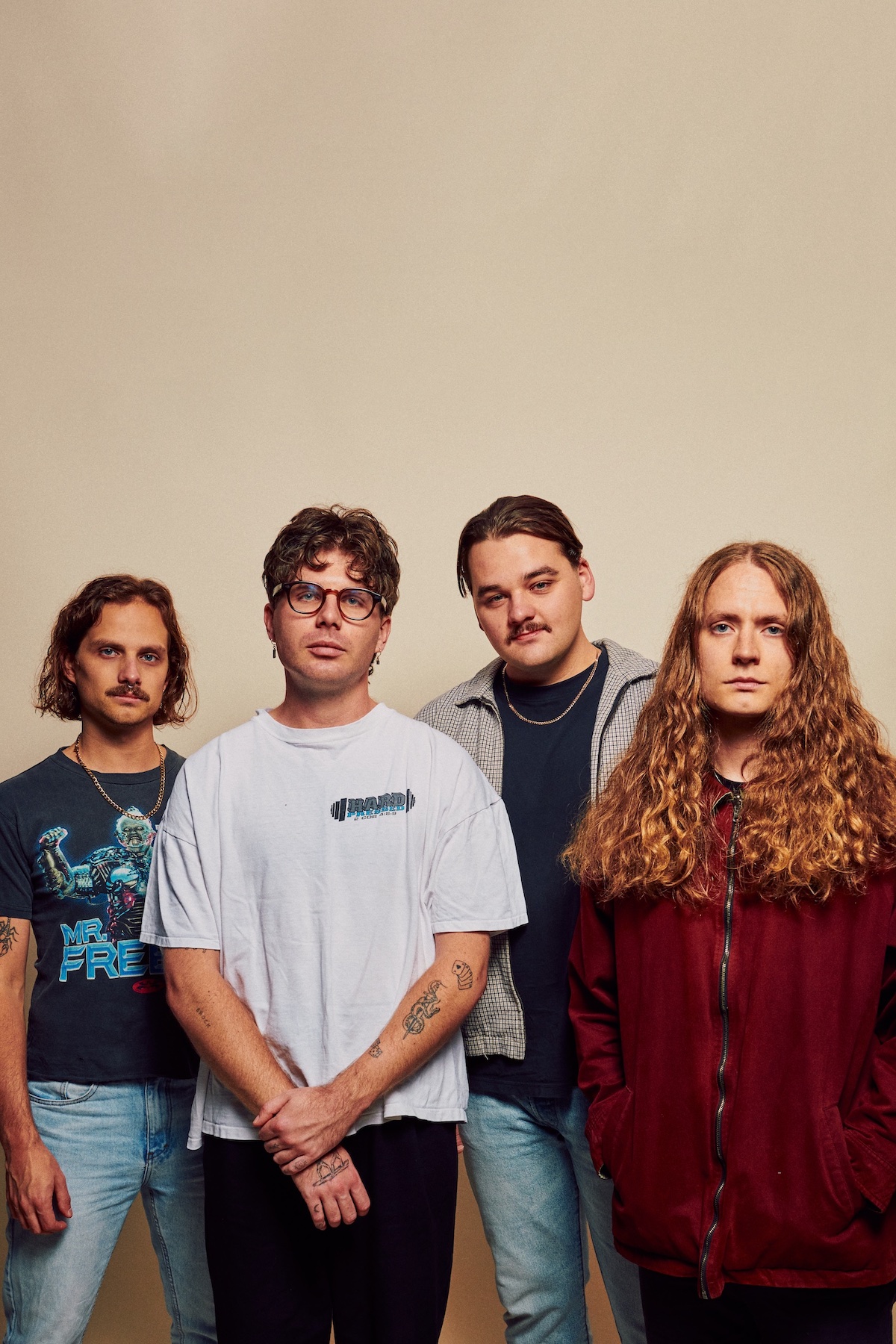
Who have you been listening to recently, speaking of other artists?
Campbell Burns: Good Morning, which is a band from Melbourne that I absolutely adore, just put out a new record which is fantastic. Brittany Howard’s new solo album is wonderful.
I’m aware you just moved to Los Angeles… how has Southern California been treating you?
Campbell Burns: I did, I moved seven months ago. I probably actually have lived here for like five minutes. The first time I ever came here, I hated it. I was in Hollywood and I just felt like I was in Grand Theft Auto. But I got introduced to the East side through some friends and seeing more of the sights and sounds and everything and just getting to know more people and figuring out a community, which is one of the big things I’m doing right now. I’m actually having time to settle in. This is trying to get out here and meet people, make friends, which is such a tricky thing as an adult, being in a new city, especially in a new country. The city is so car-centric as well. It’s terrible. I don’t have a car. I haven’t got my American license yet. So it’s also like, how the f***? I feel like I’m uncomfortable, but in a good way.
Have you been up to anything fun recently?
Campbell Burns: I went to monster trucks in Anaheim recently, which rocks. That was like the most American thing I’ve ever been to. I’ve never seen so many kids, like literal two, three-year-olds, with the most clean mullets I’ve ever seen. Perfectly shaved sides, hair well passed down their shoulders, but they still got a pacifier in their mouth watching monster trucks. And I’m like, what is going on? Yeah. But that was really fun!
— —
:: stream/purchase No Place Like Home here ::
:: connect with Vacations here ::
— — — —

Connect to Vacations on
Facebook, Twitter, TikTok, Instagram
Discover new music on Atwood Magazine
© Charlie Hardy
:: Stream Vacations ::

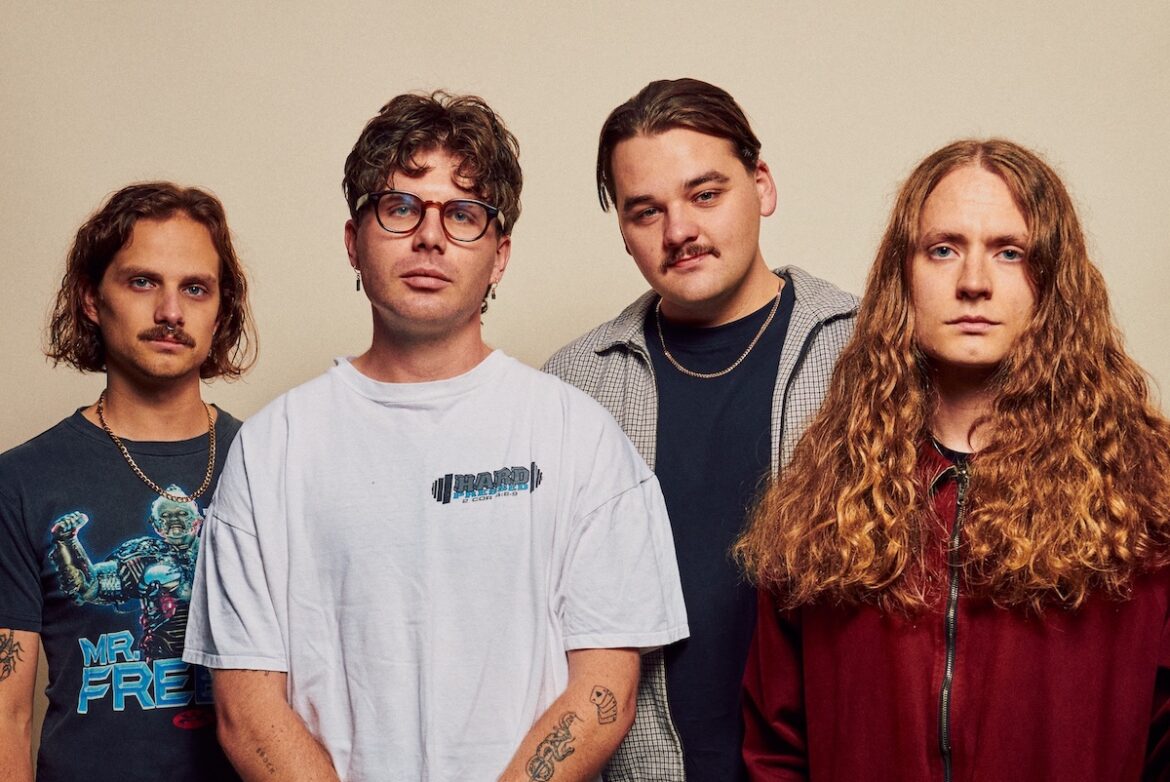
 © Charlie Hardy
© Charlie Hardy
